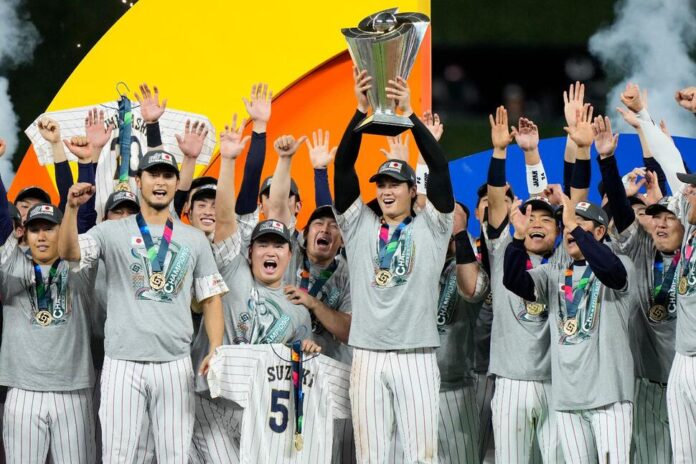This year’s World Baseball Classic left lasting memories, 47 games over two weeks that restored Japan’s supremacy and reinforced Shohei Ohtani’s unmatched ability while expanding the sport’s global footprint.
Shohei Ohtani’s strikeout of Mike Trout, Trea Turner’s go-ahead, eighth-inning grand slam against Venezuela, Japan’s walk-off semifinal win and Mexico’s comeback from a four-run deficit against Puerto Rico will be replayed over and over.
Edwin Díaz’s season-ending knee injury and Jose Altuve’s broken finger will be discussed all year, too.
This year’s World Baseball Classic left lasting memories, 47 games over two weeks that restored Japan’s supremacy and reinforced Ohtani’s unmatched ability while expanding the sport’s global footprint.
While not an international fixation like soccer’s World Cup, the event has grown though its five editions since launching in 2006.
“This is kind of our Olympics. We don’t get that opportunity to really play wherever the Olympics are at,” Kyle Schwarber said before the Americans lost to Japan 3-2 in Tuesday night’s final, when Ohtani fanned Trout to seal Japan’s first title since 2009 and third overall. Baseball is no longer a permanent Olympic sport, and Samurai Japan beat a U.S. team stocked with minor leaguers for gold when baseball was temporarily restored at the previous Games.
Played in Miami, Phoenix, Tokyo and Taiwan, the star-studded WBC will finish with revenue of $90 million to $100 million, Major League Baseball said. Attendance of 1,306,414 was the tournament’s highest, 20% over the 1,086,720 for 40 games in 2017.
This year’s semifinals on FS1 and Fox Deportes averaged 2.4 million viewers, up 96% from the semis in 2017, when the tournament was televised by MLB Network and ESPN Deportes.
“One of the things that was really important this time around was Fox stepping up to broadcast the games,” baseball Commissioner Rob Manfred said. “Nobody’s a bigger fan of the MLB Network than I am, but when you have one of the major broadcasters step up and want the event, that’s a huge deal.”
Concerns about player health have followed the tourney since its inception. Many MLB teams blocked pitchers from participating, wanting them to concentrate on preparing for the season’s start. Injuries to Díaz and Altuve reinforced those concerns.
But with MLB generating revenue and global interest from the tourney, and players eager to represent their home countries, the injury risks seem unlikely to slow the WBC’s growth.
“We all care for each other and no one wants to get hurt,” Francisco Lindor, Díaz’s teammate on Team Puerto Rico and the New York Mets, told reporters Tuesday. “But we all love our countries and want to represent our countries. … We have an opportunity to represent our countries and learn from our peers. It’s amazing.”
Japan drew three of the four most-watched WBC games ever back home going into the championship game, getting a 48.7 rating for the quarterfinal against Italy, 44.4 for the first-round game against South Korea and a 42.5 for the semifinal vs. Mexico. The figures represent the percentage of television households tuned to a telecast.
The team’s victory sparked a nationwide celebration back home. The country’s top circulating newspaper, Yomiuri, rolled out a special Wednesday afternoon edition for commuters, usually reserved for serious matters of state, late-breaking election news, or as it was last year — the assassination of former Prime Minister Shinzo Abe. “Japan, the World’s No. 1,” the headline read in Japanese.
Mexico anticipated its run to the last four will increase attention to the sport in a nation where soccer dominates.
“These two weeks are going to attract so many young players in Mexico and also Mexicans that live abroad,” manager Benji Gil said.
Following an expansion from 16 nations to 20, Britain, the Czech Republic and Nicaragua reached the tournament for the first time. All failed to advance past the group phase.
China and Israel twice had games cut short by the mercy rule, and Britain and Canada one each.
Group A was so competitive that all five nations finished 2-2, resulting in Cuba and Italy advancing over the Netherlands, Taiwan and Panama via a mathematical tiebreaker: runs allowed divided by outs.
“Obviously, a lot of countries are getting better at the game of baseball,” U.S. manager Mark DeRosa said. “I thought Colombia, man, the arms they were running out there, they weren’t name guys, but everyone was sitting 92 to 95 (mph) and had pretty decent stuff.”
Nicaraguan pitcher Duque Hebbert even managed to turn one memorable inning into a pro contract, signing a minor league deal with the Detroit Tigers after striking out All-Stars Juan Soto, Julio Rodríguez and Rafael Devers.
MLB and the players’ association have committed to the next WBC in March 2026. Manfred said it is too early to determine whether there will be tweaks to the format.
“I think that the combination of nationalism and sport is really, really powerful,” he said, “and if you have an opportunity to participate in an event that combines the two, you have to take it.”



